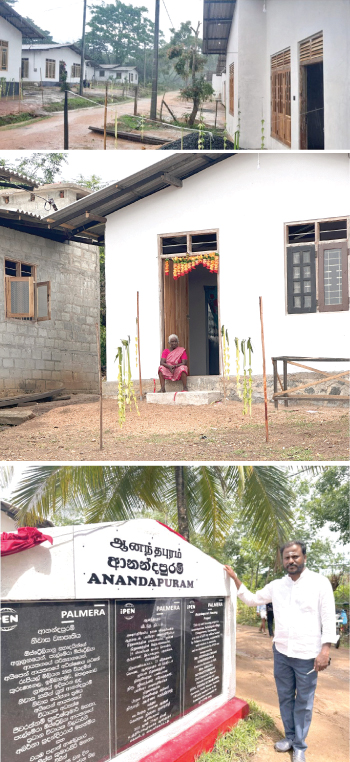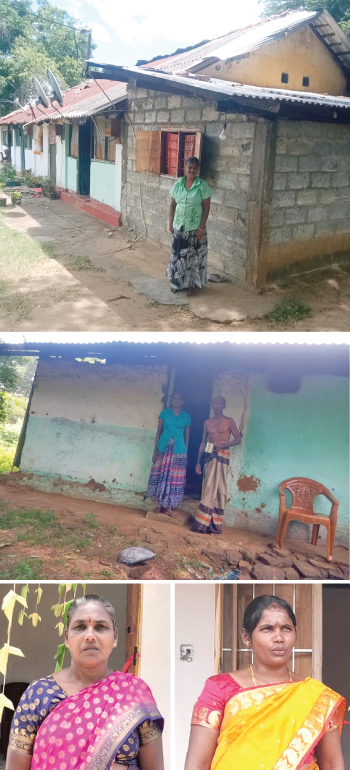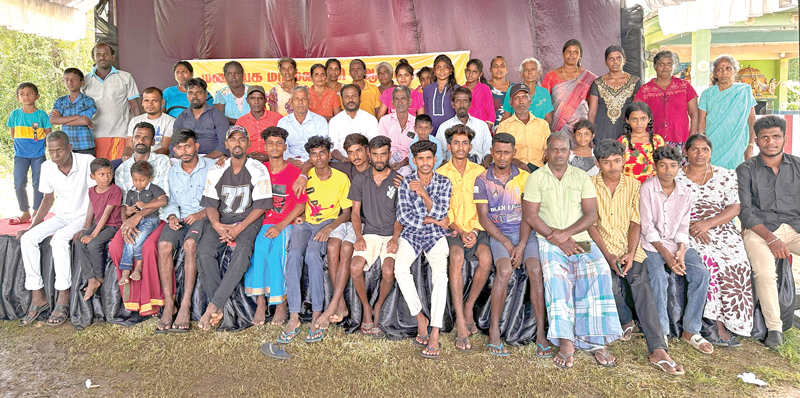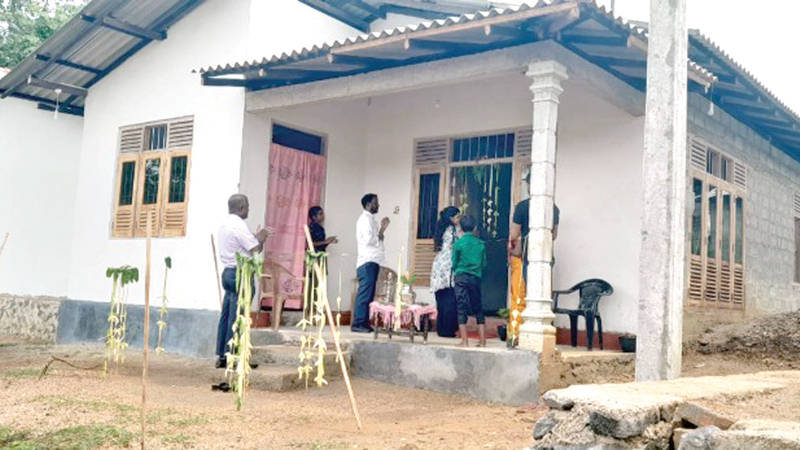 June 25, 2025, will be remembered as a historic milestone for the Malaiyaha Tamil community in Sri Lanka, a people long denied dignified housing and rightful land ownership. While successive Governments have only offered token renovations to their crumbling estate line rooms, the Malaiyaha Tamils of Bathalgoda in Kurunegala have taken a bold stand. Refusing to endure life in these inadequate dwellings any longer, they have stepped out, claimed their land rights, and built permanent homes backed by legal deeds. In doing so, they have set an unprecedented example, not only for the Malaiyaha Tamil community but for marginalised communities everywhere fighting for land justice.
June 25, 2025, will be remembered as a historic milestone for the Malaiyaha Tamil community in Sri Lanka, a people long denied dignified housing and rightful land ownership. While successive Governments have only offered token renovations to their crumbling estate line rooms, the Malaiyaha Tamils of Bathalgoda in Kurunegala have taken a bold stand. Refusing to endure life in these inadequate dwellings any longer, they have stepped out, claimed their land rights, and built permanent homes backed by legal deeds. In doing so, they have set an unprecedented example, not only for the Malaiyaha Tamil community but for marginalised communities everywhere fighting for land justice.
Bathalgoda rubber estate
For over 135 years, generations of Malaiyaha Tamil families have toiled under harsh conditions and for paltry wages on the Bathalgoda rubber estate. Despite their long and tireless service, they were confined to cramped line rooms lacking basic amenities, while the estate owners denied them the right to own even a small portion of the estate’s 281 acres or to build homes of their own.
 Just a short distance from the line rooms stood communal toilets without any water facilities. During the rainy season or at night, it was especially difficult for women and children to access them safely. At a time when calls are growing for a separate university for the Malaiyaha Tamil community, it was only in 2023 that, for the first time, a student from this area managed to pass the GCE Advanced Level examination.
Just a short distance from the line rooms stood communal toilets without any water facilities. During the rainy season or at night, it was especially difficult for women and children to access them safely. At a time when calls are growing for a separate university for the Malaiyaha Tamil community, it was only in 2023 that, for the first time, a student from this area managed to pass the GCE Advanced Level examination.
Having long been deprived of rights to education, healthcare, land, and fair wages, more than 250 families eventually decided they could no longer continue living on the estate and chose to leave. Of the approximately 300 families who once lived there, only 28 remained by 2023.
Upon learning that a portion of the estate was to be handed over to a private party, the remaining families began clearing uncultivated land and started building homes. However, this led to legal complications. As a result, six persons including one woman were prosecuted on charges of illegally occupying estate land and causing damage to estate property.
On August 17, 2023, the estate residents issued an open letter declaring, “We no longer want to live a slave-like life in line rooms. Will you grant us freedom from that?” Yet despite this heartfelt plea, not a single politician who regularly speaks of Malaiyaha Tamil issues in public came forward to offer assistance.
Yet now, even without political support, the fifth generation of Malaiyaha Tamil residents has waged and won a legal and social battle against the estate owners. They are no longer mere ‘estate people’. Today, they stand as proud residents of the newly established Anandapuram village.
The residents hailed June 25 as the happiest day of their lives. On that day, 23 new, well-built homes, a striking contrast to their former dilapidated line rooms, were inaugurated by North-Western Province Governor Tissa Kumarasiri.
This milestone was not one that was easily achieved. It was the result of a collective effort and a historic struggle. Following continuous negotiations between the residents and the estate owners, the latter agreed to withdraw the civil case filed under case number 9361/L. They consented to grant 270 perches of land with legal ownership to the 28 families for building their homes.
A journey of justice
In 2023, a protest march from Mannar to Matale marked 200 years since Indian-origin Tamils were brought to Sri Lanka. The walk drew young journalists, human rights activists, and lawyers, where the plight of Bathalgoda Estate was highlighted by the Movement for Plantation Peoples’ Land Rights (MONLAR).
At that time, the estate’s line rooms were severely dilapidated and lacked basic facilities. It was learnt that the 28 remaining families had cleared and settled on 20 perches each, only to face legal action after the estate owner filed police complaints. Further investigations revealed that rubber plantation workers were also being paid unfair wages. An exposé by the President of the Young Journalists’ Association Tharindu Jayawardhana prompted the Department of Labour to send a special team to the estate, initiating urgent investigations and interventions.
Pre-Agreement
Before the 270 perches of land were officially granted, a legal agreement with specific conditions was signed in 2024 between the estate owners and the 28 residents. While ownership of the local Hindu temple was to remain with the estate owner, the latter agreed not to obstruct villagers’ access to religious worship.
Any non-religious activities on the temple premises other than religious observances, Government programs, temple management duties, and welfare or sports activities related to children, youth, women, or elders now require prior written permission from the estate manager.
 The 28 families also had to vacate the line rooms within six months of the agreement and were prohibited from using materials from these rooms for building their new homes. Both parties agreed that no damage should be caused to the existing line rooms and residents were also permitted to remove personal belongings without causing harm.
The 28 families also had to vacate the line rooms within six months of the agreement and were prohibited from using materials from these rooms for building their new homes. Both parties agreed that no damage should be caused to the existing line rooms and residents were also permitted to remove personal belongings without causing harm.
The families were to fully cooperate with the estate’s development work, including fencing and boundary demarcations, and were told they must not hinder estate operations or damage crops or buildings.
In the event of land disputes involving third parties, the families are now obliged to legally support the estate owner, and neither the families nor their relatives may claim any additional land or estate properties beyond their allocation. They must use only officially designated paths and avoid creating or using alternate routes. Should they violate the agreement or fail to vacate the line rooms within the six-month period, the estate owner also reserved the right to cancel the agreement and pursue legal action.
Land rights through unity
Pushpavalli Marimuthu, the third generation of her family to live and work on the Bathalgoda Estate, stood proudly outside her new home. Her parents had made a living as rubber tappers on the estate, and Pushpavalli had followed in their footsteps, taking up the same work.
According to her, workers have been demanding land rights since the time her parents worked on the estate.
“They kept saying they would give us land, but no steps were ever taken to actually grant it. We could no longer continue living without land, so we began identifying and cleaning the plots ourselves. The estate owner filed police complaints against us and took legal action,” she said.
“Later, the estate owner agreed to give each of us 10 perches of land. At first, we had only managed to lay the foundation as we had no money to build the house. But with the help of an organisation, we were finally able to construct our homes,” she said. According to her, there is now a genuine sense of freedom. “After living in line rooms for so long, having our own houses makes us feel free. Our children too will grow up with dignity and freedom.”
“It was our unity and collective struggle that enabled us to secure our land rights. Our message to all Malaiyaha Tamils is clear: land rights can only be achieved through standing together. People once labelled us as ‘estate people’ or ‘line room dwellers’ but not anymore. Today, we are recognised and respected as a community.”
Arumugam Parameswari, another new house owner, recalled her difficult past. “My mother and grandmother were both born in this very village, and now I’m raising my own child here. We lived in a cramped line room with just a small corridor and a single room. Life was extremely hard even changing clothes was a challenge. We made a decision that our children should not have to endure the same hardships.”
“We didn’t dwell on whether we would succeed or fail. We simply knew we had to fight and we stayed united right to the very end. Today, my home has a corridor, two rooms, and a kitchen built to suit our needs and designed just the way we wanted.” she said proudly.
More villages
According to , Chief Operating Officer of iPEN, C. Jeevaratnam Suresh, a rights-based organisation, along with Palmera, another organisation extended crucial support to the people of Bathalgoda. Even after securing land, many families lacked the funds to build their homes. That’s when Palmera had stepped in, providing financial assistance.
“Approximately Rs. 1.26 million was allocated per house, primarily to cover the cost of construction materials. Additional funding was also provided for electricity and access to drinking water. Palmera contributed Rs. 25 million towards the construction of 23 houses. The remaining expenses were met by the residents themselves, through Samurdhi loans and by pawning their jewellery,” he said.
According to Suresh, the organisations had no intention of constructing the typical “matchbox houses” often built by the Government. “With the funds we provided, families were given the freedom to design and build homes that suited their own needs and preferences. That kind of freedom is what all Malaiyaha Tamils deserve,” he said.
“We have now successfully completed the construction work of 23 houses. If land rights are granted to the Malaiyaha Tamils, they are fully capable of building their own homes using their own resources. Organisations such as Palmera will continue to step forward to support them in the construction process. Most importantly, if civil activists, lawyers, journalists, and funding organisations unite and work collaboratively with the full participation of the community, many more villages like Anandapuram in Bathalgoda can be created,” he said.
A lesson in rights
According to human rights activist Rui Fernando, there is much to be learned from Bathalgoda’s struggle for land rights. He said that even before activists stepped in to support them, the residents had already begun their fight. Declaring that they could no longer continue living in line rooms, they started fencing off vacant plots and attempting to settle on them each family claiming around 20 perches of land.
In response, police complaints were filed against them, and legal cases were initiated in an attempt to intimidate and discourage them. Yet the residents did not yield. They stood united and continued their struggle until they secured their land rights, a journey, Fernando said, that holds powerful lessons for all.
“Following negotiations with the estate owners, the residents of Bathalgoda ultimately won the opportunity to gain legal ownership of land. Though delayed, the fact that the estate owners eventually agreed to hand over land with deeds is something that must be acknowledged and appreciated,” he said.
He said that while the initial demand was for 20 perches per family, they were ultimately granted around 10 perches each. “Even after receiving land, the challenge of building homes remained daunting. Most estate workers earn extremely low wages, and in the beginning, even their EPF and ETF contributions were not properly paid. They had to fight for those entitlements as well,” he said.
“With the support of iPEN and Palmera, the families were eventually able to construct their homes. Fernando said that land is the foundation, only with secure land can people begin to build stable and dignified lives.
He added that it is the Government’s duty to provide the funding for houses. “In the absence of such support, Palmera stepped in to fill the gap. However, critical issues such as access to clean water, roads, and formal addresses remain unresolved and must be addressed without delay,” he added.
Fernando said that the way the people of Bathalgoda secured their land rights through unity and with the support of journalists, civil activists, lawyers, and organisations such as Palmera and iPEN should be recognised not only as a model for Sri Lanka but as an inspiring example of people-powered transformation for the world.
From estate to village
The Bathalgoda rubber estate has now transformed into Anandapuram village, a rare achievement, as it is uncommon for estates where hill-country Tamils live to become recognised villages. Such a transformation requires extraordinary effort.
Human rights lawyer Tharushi Fernando, who witnessed this transformation first-hand said, “As a lawyer, I saw how the estate became a village. While many supported the Bathalgoda people’s struggle, they themselves led the fight for land rights without making any compromises.”
She said that their struggle unfolded in three stages. “For more than 150 years, they lived and worked on this land without any land rights. Yet they did not own even an inch of land. There were no basic living facilities. So, first, they decided they could no longer continue without land.”
“Second, to implement this decision, they strengthened their unity through communication and solidarity within the village.”
“Third, once united and strong, they sought and gained the cooperation of external supporters and organisations to further empower themselves. Outside support for the Bathalgoda land struggle came only at this final stage.”
“Until they built their houses, they approached the process with great care. They planned meticulously, spending all their savings and even pawning gold jewellery to realise a century-old dream born of hardship.”
“They went to police stations, traversed court steps, and invited journalists, lawyers, and human rights activists to their village for discussions. They also engaged in negotiations with the estate owners. These people have shown us that to win a struggle, one must exhaust every possible avenue.”
“Struggling for rights is a journey. Whether they have reached its end, I cannot say. According to the agreement, they still need to receive land deeds and acquire physical infrastructure necessary for village development.” she said.

Pix by B. Nirosh






